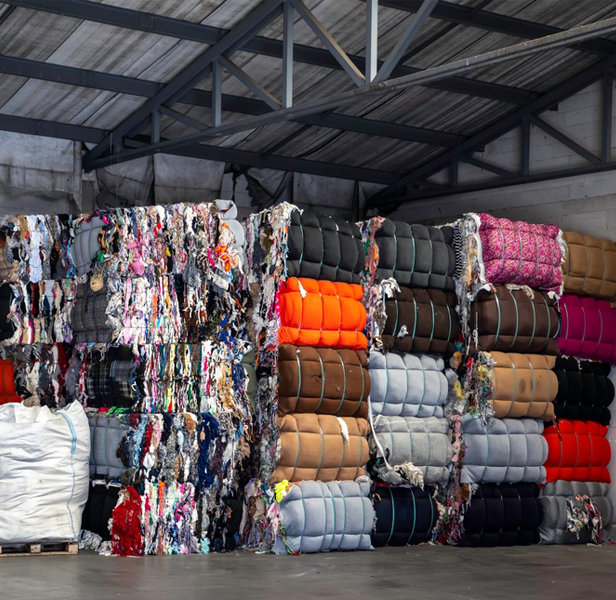Sustainability September 30, 2024
California Beefs Up Sustainability Requirements
The state has passed legislation requiring manufacturers to address textile waste, closing a loophole on its decade-old plastic bag ban and initiating greenhouse gas emissions reporting by large companies.
California has been moving forward with a number of sustainability-related legislative initiatives, closing loopholes on long-standing bills and adopting first-in-the-nation laws to address textile waste. Here’s a rundown of some recent bills, which are likely to have an impact on the promotional products industry.
Tackling Fashion & Textile Waste
A new law, signed by Gov. Gavin Newsom this month, is putting the burden on apparel makers to create a system for recycling their wares.
The extended producer responsibility (EPR) legislation, known as the Responsible Textile Recovery Act, requires manufacturers to implement and fund a statewide reuse, repair and recycling program for clothing, towels, bedding and upholstery.
“We worked really hard to consult with and eventually to align all of the stakeholders in the life cycle of textiles so that at the end there was no opposition,” Josh Newman, the Democratic state senator who sponsored the bill, told The Guardian. “That’s an immensely hard thing to do when you consider the magnitude of the problem and all of the very different interests.”
Companies that produce apparel and other textiles sold in California have until 2026 to create a nonprofit that will design collection sites, mail-back programs or other recycling solutions. However the recycling program ends up looking, it won’t be operational until 2028 or later.
The California law is the first of its kind in the U.S. and addresses the growing issue of textile waste. Thanks to trends like fast fashion, apparel is the fastest growing waste stream in the country, but only about 15% of textiles are actually recycled, according to the Environmental Protection Agency (EPA).
Industry impact: Promo suppliers are increasingly taking pains to make their products circular, and this EPR legislation will likely increase such efforts.
Closing the Single-Use Plastic Bag Loophole
Earlier this month, the governor signed a bill into law that closed a loophole in California’s long-standing plastic bag ban. The state was the first to ban thin plastic grocery bags, which are difficult to recycle and have contributed to pollution; nonetheless, a loophole allowed thicker-film plastic bags.
The new law, which will take effect Jan. 1, 2026, bans the use of both thick- and thin-film plastic bags. Stores can still offer customers recycled paper bags at checkout for a 10-cent fee per bag. By Jan. 1, 2028, those paper bags will need to be made with a minimum of 50% postconsumer recycled materials.
“Stores may offer paper bags at the point of sale, and they can also sell the canvas-style reusable bags in other areas of the store,” Nate Rose of the California Grocers Association, which supports the new ban, told NPR. “These are the bags many shoppers are already accustomed to bringing with them to carry their groceries.”
The legislation came after studies found a sharp increase in plastic bag waste in the years following California’s bag ban. For instance, a report from consumer advocacy group CALPIRG showed that the amount of discarded plastic bags jumped 47% in 2022, compared to the year the bag ban was passed – from 154,385 tons of plastic bag waste to 231,072 pounds.
Industry impact: California’s revamped bag ban – and similar bans in other states – are an opportunity for distributors to sell reusable branded totes.
Climate Disclosure Laws Moving Forward

A year ago, Newsom signed several climate disclosure laws that legal experts say will shape disclosure practices beyond California’s borders.
The legislation requires annual public disclosure of Scope 1, 2 and 3 greenhouse gas emissions by U.S.-organized entities doing business in California with total annual revenue over $1 billion. California is also requiring businesses with at least $500 million in annual revenue to prepare a biennial climate-related financial risk report, disclosing measures adopted to reduce and adapt to such risk. Emissions and climate risk disclosures must be made beginning in 2026.
The governor had proposed delaying emissions reporting requirements by two years; however, an amended bill (SB-219), which Newsom signed into law on Sept. 28, upheld the 2026 date.
Industry impact: Though the number of promo firms directly affected by this law is low, since emissions disclosure requirements don’t kick in until revenue exceeds $1 billion, it’s likely a bellwether of similar legislation to come. Outside of legal requirements, many large end-buyers have been requiring more stringent sustainability data reporting from distributors, and it’s unlikely those requests will be lessening going forward.

Promo for the Planet is your destination for the latest news, biggest trends and best ideas to help build a more sustainable and socially-responsible industry.


